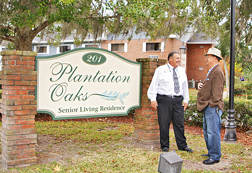
 Photo 1: As High Springs newly elected mayor, long-time resident Dean Davis looks forward to helping bring back the small-town charm he feels the city has lost. Photo 2: When High Springs Mayor Dean Davis isn’t at City Hall, it is likely he is visiting with friends and neighbors in the town where he has lived for 60 years. L-R: Howard Minzenberg, Executive Director of Plantation Oaks Senior Living Residence, enjoys a casual conversation with Davis Wednesday afternoon.
Photo 1: As High Springs newly elected mayor, long-time resident Dean Davis looks forward to helping bring back the small-town charm he feels the city has lost. Photo 2: When High Springs Mayor Dean Davis isn’t at City Hall, it is likely he is visiting with friends and neighbors in the town where he has lived for 60 years. L-R: Howard Minzenberg, Executive Director of Plantation Oaks Senior Living Residence, enjoys a casual conversation with Davis Wednesday afternoon.
HIGH SPRINGS – Dean Davis remembers High Springs before Interstate 75 came close to stopping near the town.
He remembers sitting shirtless in an un-air-conditioned ’37 Ford, laughing with his best friend and their girlfriends on a dim country road.
He remembers when every kid spent their summers learning to swim at Poe Springs.
He remembers when every store in town closed at noon on Wednesdays so people could go fishing.
“I get my history from Dean,” said Davis’ lifelong friend, Nicky Peacock. “What we don’t know, Terry Thomas does.”
Their conversations are peppered with the names of locals, passed on or moved out or still living up the street. They remember the times when High Springs was “the friendliest little town in Florida.”
Davis misses those times. He has seen people moving from big cities bringing big city ideas. It is no longer his High Springs, the one he grew up in.
Now the newly elected mayor, he hopes to bring back the small-town, family feel he thinks the city has lost.
“We didn’t used to lock our doors,” he said. “I want us to slow down and smell the flowers, enjoy the flowers.”
Railroad Important Asset
Davis said he wants to do this by focusing on the things that make High Springs unique. His first goal is to redevelop the railroad.
“I moved here in 1951, in seventh grade. I was born a few miles out on a farm. Here, everybody worked for the railroad,” he said.
He said the city exists because of the railroad. While most towns have east-west or north-south oriented roads, the streets in High Springs are skewed to accommodate trains.
By making use of rail that already runs to Newberry, Davis said High Springs could turn into a tourist destination.
He said people could ride down from Newberry on the train after watching their kids play baseball all day, eat a meal at the Great Outdoors and sleep at the Grady House. In the morning, there could be a trolley to pick them up and take them to Poe Springs. When it got dark, they could be driven back to the train and go on home.
Using what High Springs already has is important to him. He said when he grew up, Poe Springs was what people did in the summer.
“There was no TV, no video games, no Wi-Fi,” he said. “Taking my grandkids there is like stepping back into history. And it’s all tied to the railroad.”
He said while the Poe Springs issue was more recent, people have been talking about fixing up the railroad since 1988. The city commission continues to talk about the need for growth, he said, but it has options already waiting.
The city has had problems with debt in this pursuit, taking on expensive projects that the new mayor said are unnecessary. He mentioned the sewer system, explaining that with his father being a plumber, he grew up understanding waste systems. To Davis, the system is too costly for a service the city doesn’t need.
More than that, he said, people were forced to hook up to it who weren’t interested.
“Little old ladies are being forced to hook up to something they didn’t want,” he said.
Since his election to the commission in 2009, he said working for the people’s concerns has been his priority.
Change in Direction
He said he had to join the commission after seeing the direction the town was traveling. The city was spending more than it was making in the name of progress.
“Credit is okay. Debt is not,” he said.
His wife of 55 years, Elaine, prayed with him about the city, and they decided he should run. He won his first election by what he said was the highest percentage since 2000.
Davis said he felt comfortable because had a background in public speaking, having been on a parliamentary-procedure team that went to the state competition three or four times. While he was at the University of Florida, he took speech classes.
“Some people think I’m an ignorant hick, but my experience is pretty in-depth,” he said.
He was worried about his accent while in college, but a professor told him he just needed to be himself. Davis said that is why he still talks like a country boy today.
“My diction is not always crisp, and I talk a little fast,” he said. “I’ve got so much to say, I got to hurry up.”
Davis said being on the commission has given him a greater respect for the job commissioners do. He said there’s always complicated decisions to be made and disgruntled people that are never satisfied. Even harder is trying to do what the city wants without raising taxes, a move he pledges to never support.
“I keep asking, ‘How are we going to pay for this?’” he said. “And the commission hasn’t answered me back yet.”
His wife Elaine put it more simply: “He’s been beat up a lot.”
It’s been his wife’s influence that’s kept him straight, Davis said. They started dating in the tenth grade.
“I played football for High Springs High School,” he said. “We were playing Lake Butler, and this one guy ran over me like I wasn’t even there. I ran up to the coach and said, ‘I’m done with football.’ Then I sat with the cheerleaders.”
He said he married the prettiest one.
Davis studied at the University of Florida for a short while but ended up leaving to marry Elaine. For a long time, he worked for High Springs Auto Parts, eventually leaving to open up his own shop.
Peacock, who is 23 years Davis’ junior, said the shop helped a lot of young men in town establish credit. He bought a part from Davis, who put it in Peacock’s name, not his father’s.
“I used that as a reference when I got my own light bill,” he said. “That’s the kind of man Dean is.”
Davis had to close the shop in the 90s because competition from big stores like Wal-Mart was too much. This taught him the importance of buying locally.
“We used to be an industrial nation, but it starts on the local level,” he said. “We need to give preference to local contractors. Why did the elementary school expansion use a Gainesville contractor? There are local people who are qualified.”
Personal Beliefs Give Focus
For Davis, problems arise when the government thinks it’s smarter than the constituency. He said working in real estate, his current job, has taught him that the way to get what one wants is to help others get what they want.
This position came out of his commitment to Christianity.
“I accepted Jesus Christ in 1965,” he said. “Lightning didn’t flash, thunder didn’t crash, but my life has taken a different path.”
He calls Jesus his biggest inspiration, reminding him to always do his best to help others. Christianity has given him a strong sense of right and wrong, especially in government.
“I have no agenda,” he said. “I have nothing to gain. My only goal is to unify the city, to heal the hurt of the city.”
Davis has seen divisions in the city over the past six or seven years that were never there before. He said he wants citizens to get involved, to ask him questions and speak up on issues that matter.
His focus has and will always be the needs of the taxpayers. He said the problem is he no longer knows half the people in town, an issue he traces back to big-city ideas.
“If I want to live in a big city, it’s 144 miles to Tampa. It’s 25 miles to Gainesville,” he said. “It’s simpler to move somewhere else than to try to change what is meant to be a small town.”
He is excited by the different direction new commissioners Linda Clark Gestrin and Bob Barnas preach. For him, it is never too late to take a look at what is important to High Springs and bring back some of the things it has lost.
“People think that when you’re going on a journey, which we all are, it’s too late to go back.” he said. “But you can go back. If there was a fork in the road, you can go back and take the other way.”
 Alachua's 34th Annual Christmas Parade offered an eclectic mix of floats, people, cars and an assortment of animals, including horses, dogs and llamas.
Alachua's 34th Annual Christmas Parade offered an eclectic mix of floats, people, cars and an assortment of animals, including horses, dogs and llamas.


 Photo 1: As High Springs newly elected mayor, long-time resident Dean Davis looks forward to helping bring back the small-town charm he feels the city has lost. Photo 2: When High Springs Mayor Dean Davis isn’t at City Hall, it is likely he is visiting with friends and neighbors in the town where he has lived for 60 years. L-R: Howard Minzenberg, Executive Director of Plantation Oaks Senior Living Residence, enjoys a casual conversation with Davis Wednesday afternoon.
Photo 1: As High Springs newly elected mayor, long-time resident Dean Davis looks forward to helping bring back the small-town charm he feels the city has lost. Photo 2: When High Springs Mayor Dean Davis isn’t at City Hall, it is likely he is visiting with friends and neighbors in the town where he has lived for 60 years. L-R: Howard Minzenberg, Executive Director of Plantation Oaks Senior Living Residence, enjoys a casual conversation with Davis Wednesday afternoon.